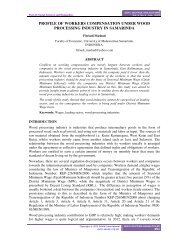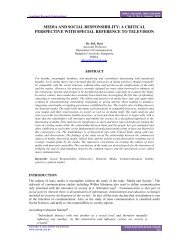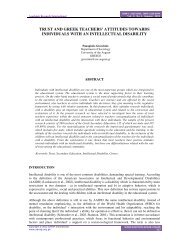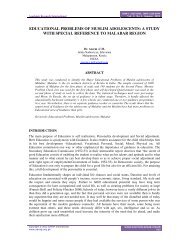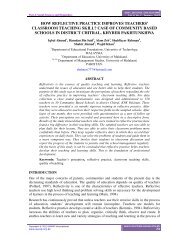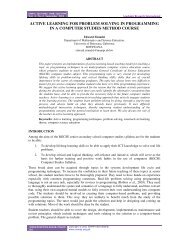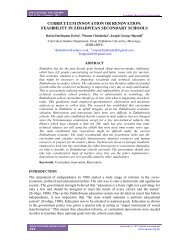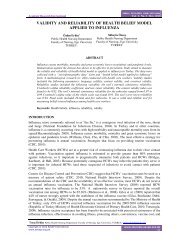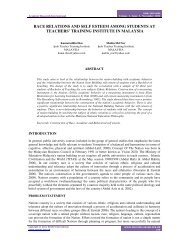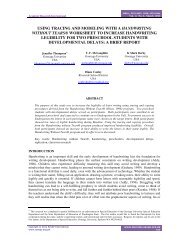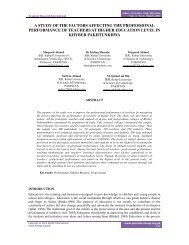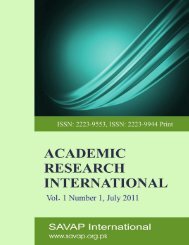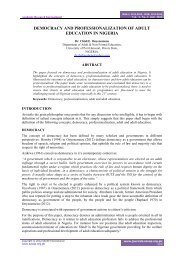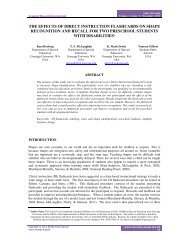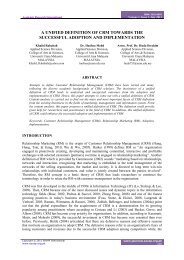Vol. 1(2) SEP 2011 - SAVAP International
Vol. 1(2) SEP 2011 - SAVAP International
Vol. 1(2) SEP 2011 - SAVAP International
Create successful ePaper yourself
Turn your PDF publications into a flip-book with our unique Google optimized e-Paper software.
Academic Research <strong>International</strong><br />
ISSN: 2223-9553<br />
<strong>Vol</strong>ume 1, Issue 2, September <strong>2011</strong><br />
words in general and short essays, develop their ideas incompletely, lack knowledge of usage and<br />
grammar such as using fewer –ly words, comma, and less punctuation compared with low<br />
apprehensive writers (Book, 1976; Daly, 1977; Rose, 1980, 1983; Faigley et al., 1981; and Reeves,<br />
1997), (5) Like to procrastinate in their works (Bloom, 1981; Faigley et al., 1981; Reeves, 1997; and<br />
Salem, 2007), (6) May behave destructively (Bloom, 1981), (7) Less confident and less successful<br />
(Daly and Miller, 1975; Daly, 1979; Rose, 1980, 1983; and Waston, 2007), (8) Have lower self<br />
esteem (Reeves, 1997; and Salem, 2007), (9) Like to choose courses and careers that they believe<br />
involve little writing (Reeves, 1997), (10) Have a few writing role models at home, in school, and in<br />
the society at large (Reeves, 1997), (11) Write very little out of class (Raimes, 1985; and Reeves,<br />
1997), (12) Score lower on tests of verbal ability (SAT), reading comprehension, and standardized<br />
tests of writing ability used for college placement (Daly, 1978; and Reeves, 1997), and (13) Lack of<br />
motivation in writing (Reeves, 1997).<br />
Research done on apprehensive graduate students discovered that students with high level of writing<br />
apprehension had written a paper or proposal that was undeveloped compared to those with low level<br />
of writing apprehension (Onwuegbuzie and Collins, 2001). A study conducted by Erkan and Saban<br />
(<strong>2011</strong>) on EFL context in Çukurova University (YADIM), Turkey discovered that many of the<br />
students left the classroom without trying to write even a few sentences when it came to the writing<br />
sections of the examinations. This suggests that the students were extremely apprehensive. It is<br />
reasonable to speculate that success in writing in a foreign language may be related to attitudes<br />
towards writing, apprehension about writing, and self-efficacy in writing (Erkan and Saban, <strong>2011</strong>).<br />
Phillips (1968, p. 42) says that “highly apprehensive individuals will avoid communication situations<br />
or react in some anxious manner if forced into them because they foresee primarily negative<br />
consequences from such engagements”. Daly & Miller (1975) discover that writing apprehension can<br />
be associated with the tendency of people to approach or avoid writing. Highly apprehensive students<br />
will avoid writing whenever possible.<br />
Abu Shawish and Atea (2010) conducted a study which involved 265 undergraduate students at three<br />
universities: Al-Aqsa University, Al-Quds University, and Islamic University. The study found that<br />
gender had no significant role in writing apprehension for the following factors (affective, cognitive,<br />
linguistics, teaching practice, students’ behavior) except feedback. Females were found to be more<br />
sensitive to the teachers’ feedback compared to males. In terms of students' academic level, i.e.<br />
sophomore, junior or senior, it was found not to have any influence on writing apprehension or the<br />
estimates of the remedies of writing apprehension except for linguistic factor where the difference<br />
was in favor of juniors. It was found that Islamic University of Gaza students were more apprehensive<br />
than those of Al-Quds Open University and Al-Aqsa University, particularly in teaching practices. A<br />
statistically significant difference in favor of the same group of students was also found in their<br />
estimates of the writing apprehension remedies. In addition, high achievers in writing classes<br />
displayed high apprehensiveness compared to low achievers and no difference was found between<br />
their estimates of the remedies of writing apprehension. Computer use in writing was found not to<br />
play any significant role in the students’ estimates of the causes as well as the remedies of writing<br />
apprehension.<br />
In summary, researchers believe that writing apprehension is a complex term and also a critical<br />
problem which may be faced by both native and non-native English learners. Writing apprehension<br />
will eventually impact the learners’ learning process. Researchers have considered writing<br />
apprehension as synonymous with writing anxiety or blocks while others have categorized it into two<br />
main levels i.e. high apprehensive writers and low apprehensive writers.<br />
METHODOLOGY<br />
A survey research design was employed in this study because it collects quantitative, numbered data<br />
using a questionnaire and statistically analyses the data to describe trends about responses to questions<br />
Copyright © <strong>2011</strong> <strong>SAVAP</strong> <strong>International</strong><br />
www.savap.org.pk<br />
www.journals.savap.org.pk<br />
192



